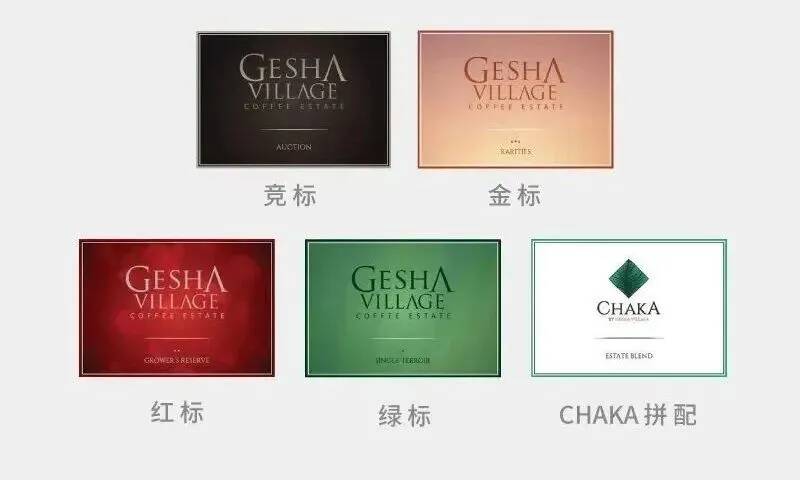How is Guixia Village coffee graded? What batch is the Guixia Village check card?
In 2005, the Emerald Manor in Panama took part in the competition and auction of the best Panama (Best Of Panama) with the variety of Geisha, which stood out among the coffees with its delicate flowers, jasmine, peach and bergamot flavors and won the championship with unusually high scores. In the subsequent auction, the rose was sold at a price of 21 US dollars per pound, breaking the world record at the time, when the rose variety became famous.
Later, by tracing its origin, the Rosa variety originally came from Ethiopia and was discovered in the Gesha area near the Kaffa forest in southwestern Ethiopia in the 1930s, when it was found that the variety was resistant to leaf rust at coffee institutes in several countries and eventually became famous in Panama.
After the rose variety became well-known, it attracted many manors and the country to introduce rose varieties, including a director Adam Overton and his photographer wife Rachel Samuel. In 2007, the couple, commissioned by Ethiopia to make a documentary about coffee, came to the Bench Maji region and discovered the Gori Rosa Forest (Gori Gesha Forest), so they came up with the idea of a coffee farm.
Later, in 2009, the couple met Willem, the owner of the Panamanian mule farm, and returned to Ethiopia in a team to find Rosa's birthplace. They came to the place known as Gesha Village in Bench Maji and found the area most likely to be the original Rose Summer. So it built its estate here in 2011 and named it "Gesha Village Coffee Estate" Rose Summer Village Manor.
Gesha Village Coffee Estate will be special because it is completely different from most Ethiopian farms. It is not a small farm, but a large farm with 500ha and has its own processing plant and coffee variety laboratory.
At present, three coffee varieties (Gesha1931, Gori Gesha and Illubabor Forest 1974) are planted in Rosa Village Manor, and they are divided into 8 plots, each with only one coffee variety.
Rose summer 1931 (Gesha1931), the rose summer variety was first discovered in Ethiopia in 1931, traveled to many countries, and finally became famous in Panama, while rose summer 1931 (Gesha1931) is a native rose summer variety found in the rose forest by the owner of the rose village, so it is named Rosa 1931 because it is very close to the Panamanian rose variety in genetic comparison. This variety is planted in the oma, surma and narsha plots of Guoxia Village Manor.
Gori Gesha was named after the establishment of the village in 2011 after the discovery of a native bean species in the Gori forest 12 miles away from the manor. This variety is planted in three plots: bangi, shewa-jibabu and shaya.
Yilu Gbagbo (Illubabor Forest 1974), an antibody variety developed by the Ethiopian Coffee Research Center, was discovered during an expedition in the Illubabor Forest in 1974 and is currently grown only on the estate of Rosa Village.
The grading of Rosa Village Manor is different from that of Ethiopia. The coffee grading of Roxia Village Manor draws lessons from that of some well-known estates in Panama. It is divided into five grades: bidding batch, gold bid batch, red mark batch, green mark batch and Chaka batch.

The competitive bidding lot (Champion's Reserve/Farm Reserve) only accounts for 3.7% of the annual output of Roxia Village Manor, which is the top lot of the manor after strict selection, while the bidding lot is divided into champion selection (Champion's Reserve) and Manor selection (Farm Reserve). At present, it can only be won in the global bidding of Ruoxia Village Coffee Manor.
The Rarities, which accounts for 10% of the estate's annual coffee production, is the highest quality except the bidding batch, which is often selected by coffee contestants to participate in coffee competitions.
The red label batch (Growers Reserve) accounts for 15% of the manor's annual coffee production and requires a score of 88 or more on SCA's 100th cup test score to be selected as this batch.
Green label batch (Single-Terroir) is from a single plot, and is a single variety of batches, the flavor intensity is weaker than the red label batch, and there is no cup score requirement.
Chaka is a combination of rosy summer produced by the estate of Rosa Village. All the plots and varieties of the estate are mixed together, with no emphasis on subdivided batches. "Chaka" means "forest" in the ancient Ethiopian language, and the estate itself is built on the edge of the primeval forest on the Ethiopian plateau, which means that the batch is taken from the forest of the entire estate.
For more information about coffee producing areas, please scan the code directly and follow: coffee comments.
Long press the QR code to follow:
TRANSLATE with
XEnglishArabicHebrewPolishBulgarianHindiPortugueseCatalanHmong DawRomanianChinese SimplifiedHungarianRussianChinese TraditionalIndonesianSlovakCzechItalianSlovenianDanishJapaneseSpanishDutchKlingonSwedishEnglishKoreanThaiEstonianLatvianTurkishFinnishLithuanianUkrainianFrenchMalayUrduGermanMalteseVietnameseGreekNorwegianWelshHaitian CreolePersian
TRANSLATE with
COPY THE URL BELOW
BackEMBED THE SNIPPET BELOW IN YOUR SITE Bing Webmaster PortalBack
Important Notice :
前街咖啡 FrontStreet Coffee has moved to new addredd:
FrontStreet Coffee Address: 315,Donghua East Road,GuangZhou
Tel:020 38364473
- Prev

What are the characteristics of Naples coffee? How to make coffee cream? Is the birthplace of espresso machines in Italy?
Espresso is a high-concentration coffee extracted in a short period of time by a coffee machine using high-pressure extraction. It is not only the basis for making various fancy coffees, but also an independent coffee product itself. Former Street Chang said that because of its high concentration, friends who have tasted concentration for the first time are likely to be highly affected by it.
- Next

Brazil is about to resume daylight saving time! Lower electricity prices and reduce coffee production costs
According to Brazilian media reports, the Brazilian Minister of Mines and Energy recently said at a press conference that Brazil will likely resume the implementation of daylight saving time by the end of this year. However, the government has not yet made a final decision on this, but if the current severe drought situation is not improved within a few days, the government will resume daylight saving time.
Related
- What grade does Jamaica Blue Mountain No. 1 coffee belong to and how to drink it better? What is the highest grade of Blue Mountain coffee for coffee aristocrats?
- What are the flavor characteristics of the world-famous coffee Blue Mountain No. 1 Golden Mantelin? What are the characteristics of deep-roasted bitter coffee?
- Can I make coffee a second time in an Italian hand-brewed mocha pot? Why can't coffee be brewed several times like tea leaves?
- Hand-brewed coffee flows with a knife and a tornado. How to brew it? What is the proportion of grinding water and water temperature divided into?
- What is the difference between Indonesian Sumatra Mantinin coffee and gold Mantinin? How to distinguish between real and fake golden Mantelin coffee?
- What does bypass mean in coffee? Why can hand-brewed coffee and water make it better?
- Unexpected! Ruixing Telunsu lattes use a smoothie machine to foam milk?!
- % Arabia's first store in Henan opens into the village?! Netizen: Thought it was P's
- Does an authentic standard mocha coffee recipe use chocolate sauce or powder? Mocha Latte/Dirty Coffee/Salty Mocha Coffee Recipe Share!
- What is the difference between Vietnam egg coffee and Norway egg coffee? Hand-brewed single product coffee filter paper filter cloth filter flat solution!

